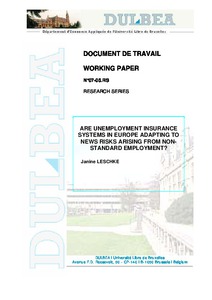Are unemployment insurance systems in Europe adapting to new risks arising from non-standard employment?
"This paper addresses the question to what extent social protection systems in different European countries do succeed in coping with the risks arising from non-standard forms of employment. Focusing on the examples of part-time and temporary employment, the paper will examine ex-clusionary tra...
| Main Author: | |
|---|---|
| Institution: | ETUI-European Trade Union Institute |
| Format: | TEXT |
| Language: | English |
| Published: |
Brussels
2007
ULB |
| Subjects: | |
| Online Access: | https://www.labourline.org/KENTIKA-19189706124919079889-are-unemployment-insurance-sys.htm |
| Summary: | "This paper addresses the question to what extent social protection systems in different European countries do succeed in coping with the risks arising from non-standard forms of employment. Focusing on the examples of part-time and temporary employment, the paper will examine ex-clusionary transitions and the access to unemployment insurance benefits of workers concerned by these forms of employment. The European Community Household Panel Data (ECHP) will be used. The general hypothesis is that the adaptability of unemployment insurance systems varies between welfare regimes. Therefore, four countries will be compared: Denmark, Ger-many, Spain and the United Kingdom." |
|---|---|
| Physical Description: | 41 p. Digital |

